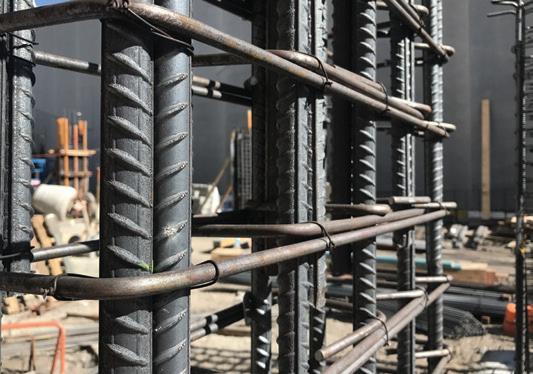
5 minute read
CIVIL INFRASTRUCTURE SECTOR READY TO BOOST THE ECONOMY
CIVIL INFRASTRUCTURE SECTOR READY TO
BOOST THE ECONOMY
Advertisement
by Chris Melham, CEO, Civil Contractors Federation (National)
The civil construction industry has demonstrated its strength and resilience in its response to the challenges thrown at it from COVID-19. Companies continue to deliver much needed civil construction projects right across the country, helping to reinforce to governments the importance of the industry to the national economy.
The industry has been adaptable and flexible, with companies implementing new measures at worksites to manage the health and safety of their workers.
And in every state and territory, the Civil Contractors Federation is working tirelessly with governments to support and facilitate greater investment in civil construction projects.
COVID-19 is presenting a two-speed economy regarding its business impact on different industry sectors and its health impact and recurrence across the country. It continues to pose challenges for the industry in the weeks and months ahead.
COVID-19 does, however, present the industry with opportunities that it can take advantage of to ensure it emerges from this crisis stronger and more resilient.
To take advantage of these opportunities, Civil Contractors Federation National (CCF National) has been playing an active role on behalf of the civil construction industry by providing the Federal Government with a clear, consistent and unified voice.
CCF National is bringing to the government’s attention the steps that need to be taken to minimise the impact of the crisis on the civil construction industry and the Australian economy which is now in recession, and what needs to be done to come out stronger on the other side.
INDUSTRY PROVIDES FEEDBACK
CCF National is advocating directly to the Prime Minister, Deputy Prime Minister and Department of Infrastructure on some specific measures that need to be implemented as a matter of urgency to deal with short and long-term challenges.
It has put forward five separate submissions on the measures needed to bolster Australia’s response to COVID-19.
Central to these submissions has been its recommendation to bring forward capital investment from the already committed ten-year $100 billion infrastructure program, to disaggregate large projects, and to spread the allocation across as many Tier 2, Tier 3 and below companies as possible.
To strengthen its advocacy campaign, CCF National recently carried out a survey of its members to gauge the impact of COVID-19 on their businesses and in turn the civil construction sector to ensure it has strong evidence to support its submissions and recommendations.
The survey sought to obtain feedback and data on three key areas: ♦ The business impact of COVID-19 on civil construction companies ♦ The capacity for companies to tender for more civil construction projects in the short term ♦ The likelihood of companies employing more workers should they be successful in a tender
The survey was completed by companies who operate across the broad spectrum of civil construction, including: roads, bridges, drainage, ports, water, power, utilities, telecommunications, etc. and responses were received from Tier 1, Tier 2, Tier 3 and smaller companies.
The overriding conclusion of the survey strongly reaffirms the need for swift and targeted action by governments of all levels to manage the impacts of COVID-19, and importantly, it confirms that the civil construction sector has the capacity to boost the economy during these difficult economic times.
CCF members confirmed they can take on more civil infrastructure projects and employ thousands more workers to stimulate the Australian economy if additional project monies were invested into the sector. ♦ 92 per cent of respondents indicated they would be in a position to tender for projects in the value of $0-$50 million if the government increased funding for civil construction projects ♦ 64 per cent of respondents indicated they would need to employ additional people if they were successful in tendering for a new infrastructure project/s
These results send a strong message to governments that the civil construction sector is ready, willing and able to boost the economy during and after COVID-19. CCF’S RECOMMENDATIONS
The survey report provides five key recommendations to government based on the results. These recommendations are designed to assist the government and CCF National’s policy making process, both during and post COVID-19, to ensure both government and industry challenges are addressed.
CCF National has provided the survey results to the Prime Minister and relevant ministers with a request that the government tables the report to members of the National Cabinet.
These investments and reforms include: ♦ Immediately increasing Federal Government spending for civil infrastructure projects by bringing forward monies from the ten-year $100 billion rolling infrastructure investment program ♦ Allocating more projects to civil construction companies operating at Tier 2, Tier 3 and below ♦ Disaggregating larger projects ♦ Ensuring there is a fairer spread of projects across all
Australian jurisdictions ♦ Developing and releasing a public agency supplier payment policy as a matter of urgency as a form of injecting cash into the civil construction supply chain by ensuring the immediate payment of all outstanding claims and prompt payment of all future claims ♦ Urgently reforming contracts and the procurement policy/process aimed at achieving a more balanced approach to risk allocation and the development of collaborative contracts ♦ Increasing the level of training, education and up-skilling funding
CCF National will continue to advocate to the Federal Government on the industry’s behalf, both during and beyond COVID-19, including the need to increase the longer-term civil construction investment pipeline by using debt funding in this era of historically low interest rates.
In particular, it will build upon the results of its member survey to strengthen its ongoing advocacy agenda on behalf of the civil construction industry, which contributes $134.2 billion to the national economy and employs 1.1 million people.
Full results of the survey can be found at www. civilcontractors.com/communication/national-policies. For further information, visit www.civilcontractors.com or contact the CCF National Office on (02) 6273 8312.
About Civil Contractors Federation (CCF)
Civil Contractors Federation (CCF) is the peak industry body representing Australia’s civil construction industry, with more than 2,000 contractor and associate members nationally. CCF Members are responsible for the construction and maintenance of Australia’s infrastructure, including roads, bridges, pipelines, drainage, ports and utilities. Our members also play a vital role in the residential and commercial building industry by providing earthmoving and land development services including the provision of power, water, communications and gas.










